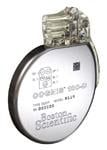
March 22, 2010 – The FDA’s Circulatory System Devices Panel last week unanimously recommended expanding the indication for cardiac resynchronization therapy defibrillators (CRT-Ds) to slow the progression of heart failure in patients with asymptomatic or mild heart failure (HF).
The panel recommended the expansion include the majority of the studied population of the landmark MADIT-CRT clinical trial, which evaluated the ability of these devices to help slow HF in New York Heart Association (NYHA) Class I and II patients. The study used Boston Scientific’s COGNIS CRT-D.
“Boston Scientific welcomes the panel’s decision to recommend expanding the current indication to include the majority of the MADIT-CRT population,” said Hank Kucheman, executive vice president and group president, cardiology, rhythm and vascular for Boston Scientific. “If an expanded indication is approved by the FDA, many additional heart failure patients would be eligible for this therapy, which has been clinically proved to slow the progression of this severe and life-limiting condition.”
If approved, Boston Scientific would become the only company with an FDA-approved CRT-D for high-risk class I and II[1] patients with left bundle branch block (LBBB) morphology and sinus rhythm. These patients accounted for 70 percent of the MADIT-CRT population. Currently, heart failure patients must be defined as NYHA Class III or IV to be indicated for a CRT-D device.
In response to a request from the FDA, Boston Scientific worked with the MADIT-CRT Executive Committee to perform an extensive subgroup analysis of the trial data. The subgroup analysis showed
that a simple finding on an electrocardiogram of LBBB was the best baseline characteristic in the trial to predict which asymptomatic or mild heart failure patients were most likely to benefit from a CRT-D.
LBBB is a condition in which the activation of the left ventricle is delayed. As a result, portions of the left ventricle contract later than the rest of the left ventricle and right ventricle, reducing the heart’s pumping ability.
Results of the MADIT-CRT trial were published in the October 2009 issue of the New England Journal of Medicine. The primary endpoint showed that Boston Scientific’s CRT-Ds were associated with a 34 percent relative reduction in the risk of all-cause mortality or first heart failure event in asymptomatic and mild heart failure patients, when compared to standard implantable cardioverter defibrillators (ICDs). In addition, data presented to the panel demonstrated that CRT-Ds reduced the relative risk of heart failure events by 42 percent when compared to ICD therapy. MADIT-CRT is the world’s largest randomized study of NYHA Class I and II patients, with more than 1,800 patients enrolled at 110 centers worldwide.
For more information: www.bostonscientific.com
1. MADIT-CRT patients are asymptomatic or mildly symptomatic, NYHA Class I (ischemic) and Class II (ischemic and non-ischemic). High-risk is defined as QRS width >/=130 milliseconds and Left Ventricular Ejection Fraction = 30%. The NYHA clinical classifications of heart failure patients rank patients as Class I-II-III-IV, according to the degree of symptoms or functional limits, from asymptomatic to bed ridden.


 January 05, 2026
January 05, 2026 









